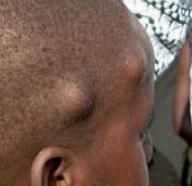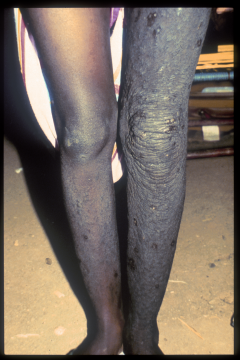The Onchocerciasis Vaccine for Africa
Global initiative to advance river blindness vaccine
The University of Edinburgh has joined with 14 other international organisations, including the University of Glasgow, Imperial College London, University of Liverpool and the Sabin Vaccine Institute Product Development Partnership, to launch a new global initiative to advance the development of a vaccine for river blindness.

Onchocerciasis, or river blindness, is a parasitic disease caused by a nematode worm and transmitted through the bite of blackflies. An estimated 17 million people are infected with more than 99% of these cases spread through 31 countries in sub-Saharan Africa. As the name suggests, infections can lead to blindness, but over 70% of infected individuals will suffer from an eruptive skin disease which can be severe and debilitating, with a particularly serious negative impact on the lives of women.
The new partnership, called The Onchocerciasis Vaccine for Africa Initiative (TOVA), builds on over 30 years of research by partner laboratories in Africa, Europe and the United States. This involved development of preclinical (laboratory animal) models as well as detailed immunological investigations of human infections, which ultimately led to the identification of several protective antigens as lead vaccine candidates.
The purpose of TOVA is to take one vaccine candidate to a phase one safety trial by 2017 and phase two efficacy trials by 2020.
This would be the world’s first vaccine for this long-neglected disease and will help achieve WHO goal of elimination of onchocerciasis from the African continent. Vaccination would complement current use of a drug called ivermectin, particularly in regions where mass drug administration cannot be implemented for safety reasons, and could make a major contribution to eliminating one of the most serious public health risks for African communities.
The longer-term plan is to administer the onchocerciasis vaccine to children as part of national immunization programmes. Dr. Alex Debrah, Dean of the Faculty of Allied Health Sciences of the Kwame Nkrumah University of Science and Technology, Kumasi, Ghana said, “A vaccine could prevent millions of children in Africa from becoming blind”.

More information can be obtained from: Professor David Taylor (David.W.Taylor@ed.ac.uk; on the TOVA web site http://www.riverblindnessvaccinetova.org/);and in an editorial by Makepeace, Babayan, Lustigman and Taylor (http://informahealthcare.com/doi/abs/10.1586/14760584.2015.1059281).
TOVA partners in Africa are: the University of Buea, Cameroon; Research Foundation in Tropical Disease and Environment, Cameroon; the Cameroon Academy of Sciences; and Kwame Nkrumah University, Ghana. European partners are: the University of Edinburgh, UK; the University of Liverpool, UK; the University of Glasgow, UK; Muséum National d’Histoire Naturelle, Paris, France; University Hospital of Bonn, Germany; and Imperial College, London, UK. TOVA partners in the United States are: New York Blood Center; Thomas Jefferson University, Philadelphia; Louisiana State University, Baton Rouge; the Sabin Vaccine Institute, Washington DC; and Baylor College of Medicine, Houston.

